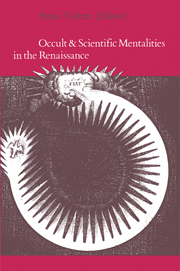Book contents
- Frontmatter
- Contents
- List of contributors
- Editor's preface
- Introduction
- 1 At the crossroads of magic and science: John Dee's Archemastrie
- 2 The occult tradition in the English universities of the Renaissance: a reassessment
- 3 Analogy versus identity: the rejection of occult symbolism, 1580–1680
- 4 Marin Mersenne: Renaissance naturalism and Renaissance magic
- 5 Nature, art, and psyche: Jung, Pauli, and the Kepler–Fludd polemic
- 6 The interpretation of natural signs: Cardano's De subtilitate versus Scaliger's Exercitationes
- 7 Kepler's attitude toward astrology and mysticism
- 8 Kepler's rejection of numerology
- 9 Francis Bacon's biological ideas: a new manuscript source
- 10 Newton and alchemy
- 11 Witchcraft and popular mentality in Lorraine, 1580–1630
- 12 The scientific status of demonology
- 13 “Reason,” “right reason,” and “revelation” in midseventeenth-century England
- Index
6 - The interpretation of natural signs: Cardano's De subtilitate versus Scaliger's Exercitationes
Published online by Cambridge University Press: 12 January 2010
- Frontmatter
- Contents
- List of contributors
- Editor's preface
- Introduction
- 1 At the crossroads of magic and science: John Dee's Archemastrie
- 2 The occult tradition in the English universities of the Renaissance: a reassessment
- 3 Analogy versus identity: the rejection of occult symbolism, 1580–1680
- 4 Marin Mersenne: Renaissance naturalism and Renaissance magic
- 5 Nature, art, and psyche: Jung, Pauli, and the Kepler–Fludd polemic
- 6 The interpretation of natural signs: Cardano's De subtilitate versus Scaliger's Exercitationes
- 7 Kepler's attitude toward astrology and mysticism
- 8 Kepler's rejection of numerology
- 9 Francis Bacon's biological ideas: a new manuscript source
- 10 Newton and alchemy
- 11 Witchcraft and popular mentality in Lorraine, 1580–1630
- 12 The scientific status of demonology
- 13 “Reason,” “right reason,” and “revelation” in midseventeenth-century England
- Index
Summary
It is sometimes the case that historians of science neglect the vigorous humanistic tradition of science – Aristotelian physics and Galenic medicine – which is represented in the Renaissance by a bibliography many times greater than that of the experimental literature to which they direct their attention. Such neglect can disguise to modern readers the nature of the conceptual problems encountered to some degree by all Renaissance thinkers and can suppress differences perceived by them, even if not apparent to us today. Sixteenth-century scientific debates share a vocabulary, a mode of expression, and a conception of argumentation and genre: They are divided by issues in virtue of which a generation of thinkers formulated their individual conceptions of the world and its workings. This chapter is devoted to the study of one such debate which was widely known and often quoted: that which opposed Girolamo Cardano (1501–76) to Julius Caesar Scaliger (1484–1558). Of the two, Cardano has attracted more attention because his writings (and especially the De subtilitate) lie on the fringes of occult and experimental literature; Scaliger's answer to the De subtilitate belongs squarely to the humanistic tradition of science. Cardano explicitly rejects Aristotelianism as a synthetic explanation of the universe and thus is seen as forward looking; Scaliger represents, in the traditional view, that dead bough of the tree of knowledge usually labeled scholasticism, which is characterized by empty verbiage, obscurantism, and incongruity with the real and the natural.
- Type
- Chapter
- Information
- Occult Scientific Mentalities , pp. 231 - 252Publisher: Cambridge University PressPrint publication year: 1984
- 8
- Cited by



